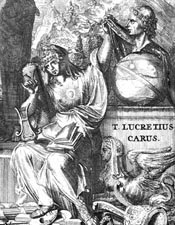Lucretius’s De Rerum Natura
, translated by Kelk, Christopher (contributor-contact-email)
De rerum natura (On the Nature of Things) is a didactic poem from the 1st century BC by Lucretius, aimed at presenting Epicurean thought to a Roman readership. Spanning six books and approximately 7,400 dactylic hexameters, it articulates Epicurean physics using poetic devices. The text delves into atomism, the essence of mind and soul, sensory perception, cognition, the formation of the world, and various cosmic and earthly occurrences. Lucretius suggests that the world operates without gods’ influence, driven by chance rather than divine will.
Lucretius’ mission is to articulate and expand upon Epicurus’ principle that human suffering stems from fear of divine judgment. Epicurus employed atomistic theory to argue the cosmos originated from random particle motion, not a deity’s will. He maintained that gods exist but are uninvolved with humanity, thus humans should live unafraid of divine retribution. Lucretius writes to dispel fears of the supernatural by illustrating that observable phenomena can be explained by natural law without requiring divine action.

Kelk, Christopher
Support Open-Access:
Your contribution keeps our classical translations available to all. Every dollar helps support classics education and funds the expansion of our catalogue. Value what we do? Donate now.
File Downloads:
© Copyright, All Rights Reserved. This work may be freely reproduced, stored and transmitted, electronically or otherwise, for any non-commercial purpose. Conditions and Exceptions apply.